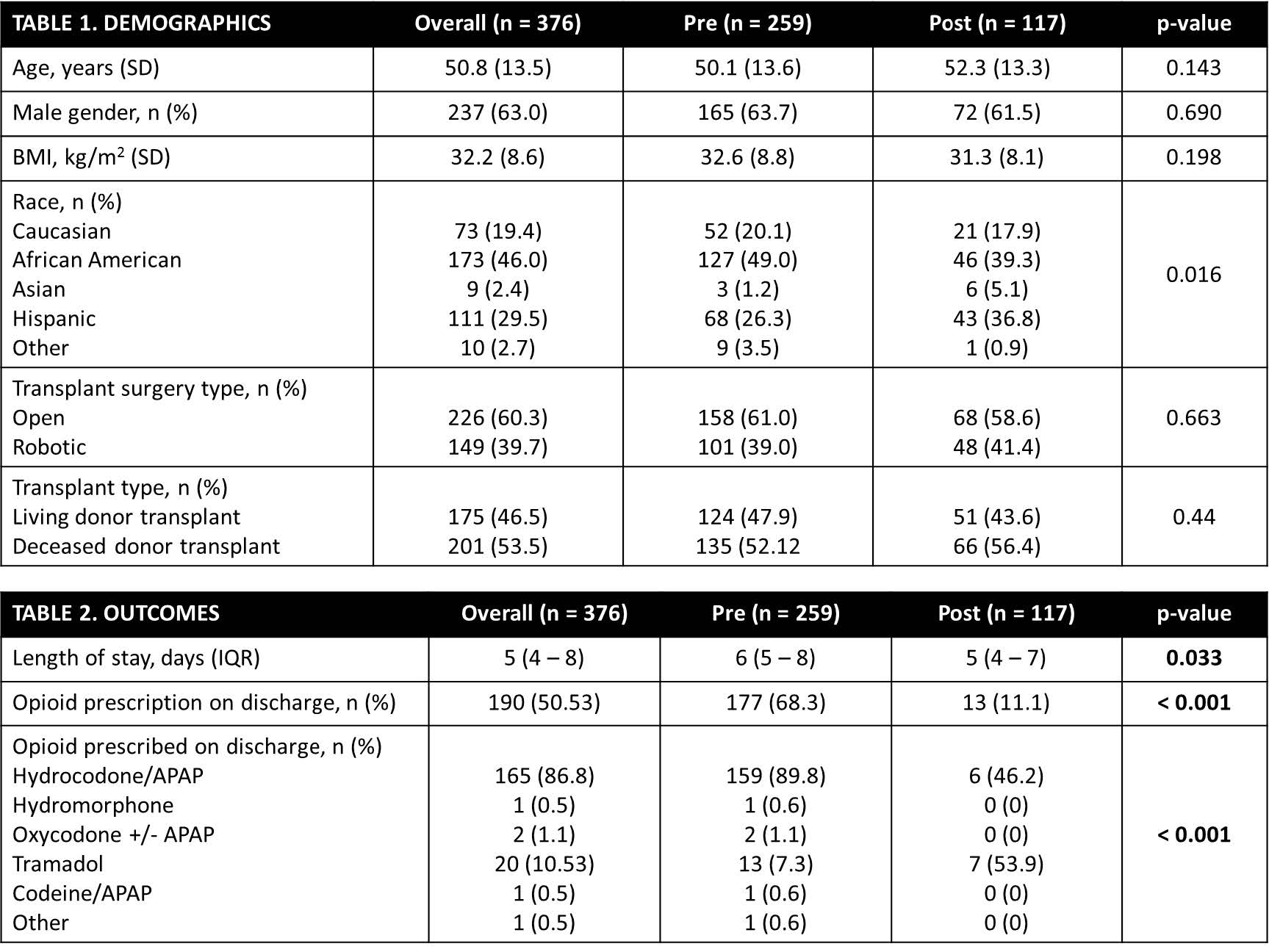The Implementation and Impact of an Opioid Minimization Protocol in an Urban Renal Transplant Population
A. Lichvar, M. Campara, E. Benedetti, J. Benken
University of Illinois at Chicago, Chicago, IL
Meeting: 2019 American Transplant Congress
Abstract number: 439
Keywords: Kidney, Pain, Psychosocial
Session Information
Session Name: Concurrent Session: Kidney Psychosocial II: Substances and Access & Barriers
Session Type: Concurrent Session
Date: Tuesday, June 4, 2019
Session Time: 2:30pm-4:00pm
 Presentation Time: 2:42pm-2:54pm
Presentation Time: 2:42pm-2:54pm
Location: Room 302
*Purpose: The opioid epidemic within the United States has devastated patients and their families in addition to triggering a national public health crisis. Unnecessary prescribing of opioids in the post-operative setting is a major contributor to narcotic exposure and harm. The purpose of this evaluation is to assess the impact of an opioid sparing protocol and post-operative pain education on the narcotic prescribing patterns in renal transplant (RTx) recipients upon discharge from the transplant admission.
*Methods: Adult renal transplant recipients from 01/2015 to 09/2018 were analyzed. Opioid sparing protocols were piloted in 2016 with wider implementation 10/2017. An educational in-service was given to all transplant nursing staff on pain assessment and management. Patient education was also revised to address patient expectations on post-operative pain management. Inpatient opioids were rapidly titrated and discontinued with the intention of utilizing acetaminophen for post-operative pain management on discharge from the transplant admission. Percent of patients discharged on opioids were compared pre- and post-protocol implementation. Opioids prescribing was also assessed across time and between open and robotic RTx.
*Results: Overall, 376 adult RTx patients were included. Patients were 63% male, 46% African American, and were an average of 50.8 (SD +13.5) years old (Table 1). A majority of patients underwent open RTx (60.3%) and received deceased donor RTx (53.5%). Opioid prescribing on transplant discharge was significantly lower after opioid minimization protocol and education (pre 68.3% vs. post 11.1%, p < 0.001). Transplant length of stay was significantly shorter post-opioid minimization protocol (p=0.03). There was no difference in opioid prescribing based on RTx surgery type pre (p=0.78) or post-protocol (p=0.33) implementation. Table 2 details outcome differences. Over time, there was a significant downtrend in opioid prescribing on discharge (Figure 1). If opioid therapy was required post-protocol, tramadol (7/13, 53.9%) was the predominant agent prescribed.
*Conclusions: Opioid minimization and non-opioid prescribing is feasible and well-tolerated within an adult RTx population with the proper patient and staff education.
To cite this abstract in AMA style:
Lichvar A, Campara M, Benedetti E, Benken J. The Implementation and Impact of an Opioid Minimization Protocol in an Urban Renal Transplant Population [abstract]. Am J Transplant. 2019; 19 (suppl 3). https://atcmeetingabstracts.com/abstract/the-implementation-and-impact-of-an-opioid-minimization-protocol-in-an-urban-renal-transplant-population/. Accessed February 22, 2026.« Back to 2019 American Transplant Congress


